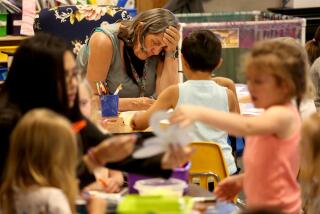Authors Put In a Good Word About Writing
When children’s author Monica Gunning attended school in Jamaica, children from first through sixth grades were all crammed into one room, she told wide-eyed students Tuesday at Monte Vista Intermediate School.
Then in her lilting island accent, she read “Classroom Under the Trees,” from one of her latest poetry collections, “Not a Copper Penny in Me House.”
Gunning was one of three children’s authors who visited the school’s sixth-, seventh- and eighth-graders as part of the 10th annual Day with an Author program.
“An author’s life is a little solitary,” Gunning said. “And if I’m writing for children, then it is good to get out and listen to them, hear their ideas. And, I hope to inspire them to be writers when they grow up.”
Thirty-two children’s authors visited 17 schools in Camarillo and Somis.
“It gives them a real idea of what writing is about,” said eighth-grade teacher Sue Ellen Brazell. “They also get to hear the music of the language.”
Gunning told the students she has “written a poem as many as 20 times before being satisfied with its rhythm.”
Students were amazed.
“Writing is much more than just words on paper,” said Joshua Graziani, 14. “There’s a lot of background in her work and it’s a lot more involved than what I thought.”
In the school’s library, two other authors met with children. While science and nonfiction writer Judy Presnall explained outlines, proposals, book reviews and royalties, mystery writer Leonard Tourney spoke to another group about creativity and perseverance.
“You begin with what is, and then imagine what might be and spin a tale from that,” said Tourney, who teaches writing at UC Santa Barbara.
Tourney, the author of “Frobisher’s Savage” and “Low Treason,” encouraged students to write despite the difficulties of getting published.
“Often, adults discourage children and dampen their enthusiasm by pointing out the road they’ve chosen is a difficult one,” he said. “I try to point out that it is not that difficult . . . and if that’s what they want to do, they should do it.”
More to Read
Sign up for our Book Club newsletter
Get the latest news, events and more from the Los Angeles Times Book Club, and help us get L.A. reading and talking.
You may occasionally receive promotional content from the Los Angeles Times.






